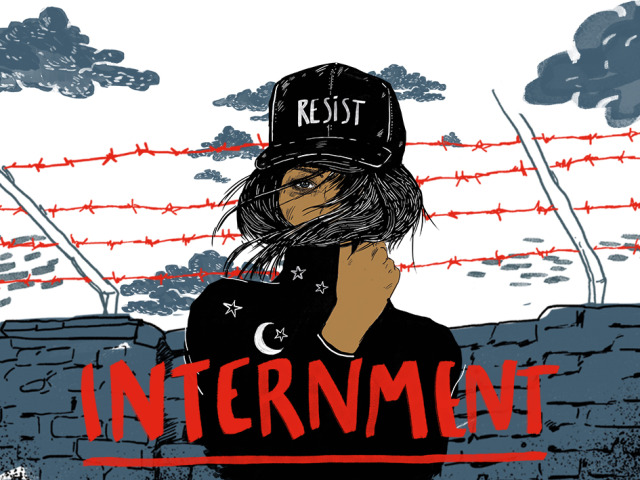A Letter to the Reader from Samira Ahmed
When fascism comes to America, it will come draped in the flag.
You don’t need to be a student of history to see how nationalism, disguised as patriotism, can take hold of a country, justifyin… …more

When fascism comes to America, it will come draped in the flag.
You don’t need to be a student of history to see how nationalism, disguised as patriotism, can take hold of a country, justifying terrible and cruel acts. You only need to turn on the news.
The American government’s “zero tolerance” border pol-icy has literally torn children from their parents’ arms as they attempt to cross into America for a better life, many seeking asylum and running from danger. As I write this, nearly 13,000 children, including infants and toddlers, many forcibly separated from their parents, have been detained by the government, often caged, before being transferred to shelters. In September 2018, under the cover of darkness, around 1,600 migrant children were taken from those shelters and relocated to a tent city in Tornillo, Texas—where they sleep in bunks, twenty to a tent, with no access to school. This camp is neither licensed nor monitored by child-welfare authorities. Further, there are orders for the Navy to erect austere detention centers in abandoned airfields in California, Arizona, and Alabama to hold nearly 120,000 migrants.
Make no mistake. These are internment camps. This is internment.
Pay attention to the racist demagoguery and scapegoating that aligns with that policy: immigrants and migrants are “animals” who “pour into and infest our country.” They are “rapists” and “criminals” who put a strain on our economy. Then turn to our history books to understand the rhetoric of extermination that has been used again and again by authoritarians the world over.
Consider, too, that half of all Latinx characters in popular TV shows are depicted as criminals. Representation matters. Racist stereotypes spread through our culture and politics too easily and give cover for racist politicians, who first dehumanize groups and then enact policies that take away their livelihoods and, often, their lives.
No moment in American history exists in a vacuum. Nationalism and fascism are not new; indeed, they are a part of American soil. This fact gave birth to this novel. The events in Internment—though they take place “fifteen minutes” into America’s future—are deeply rooted in our history. You are bearing witness to them now, in our present.
In 1924, riding a wave of anti-Asian sentiment, the US government halted almost all immigration from Asia. Within a few years, California, along with several other states, banned marriages between white people and those of Asian descent.
With the onset of World War II, the FBI began the Custodial Detention Index—a list of “enemy aliens,” based on demographic data, who might prove a threat to national security, but also included American citizens—second- and third-generation Japanese Americans. This list was later used to facilitate the internment of Japanese Americans.
In 1940, President Franklin D. Roosevelt signed the Alien Registration Act, which compelled Japanese immigrants over the age of fourteen to be registered and fingerprinted, and to take a loyalty oath to our government. Japanese Americans were subject to curfews, their bank accounts often frozen and insurance policies canceled.
On December 7, 1941, the Japanese attacked a US military base at Pearl Harbor, Hawaii. More than 2,400 Ameri-cans were killed. The following day, America declared war on Japan.
On February 19, 1942, FDR signed Executive Order 9066, permitting the US secretary of war and military commanders to “prescribe military areas” on American soil that allowed the exclusion of any and all persons. This paved the way for the forced internment of nearly 120,000 Japanese Ameri-cans, without trial or cause. The ten “relocation centers” were all in remote, virtually uninhabitable desert areas. Internees lived in horrible, unsanitary conditions that included forced labor.
On December 17, 1944, FDR announced the end of Japanese American internment. But many internees had no home to return to, having lost their livelihoods and property. Each internee was given twenty-five dollars and a train ticket to the place they used to live.
Not one Japanese American was found guilty of treason or acts of sedition during World War II. The 442nd Infantry Regiment of the United States Army, comprised almost solely of second-generation Japanese American soldiers, remains the most decorated unit in American history.
In war propaganda, Japanese Americans were depicted as enemies of America, animalistic, murderous, unable to assimilate to American culture.
And now here we are again. Refugees forced into internment camps. Muslim bans. Border walls. Police brutality. The rights of gun owners being valued more than the lives of our children. Racism. Islamophobia. Ableism. Homophobia. Anti-Semitism. Scapegoating immigrants. The politics of exclusion. The rise of nationalism and white supremacy, unmasked and waving our flag.
I feel a lot of anger.
But I believe in hope. I believe that the things that are wrong with America can be fixed by Americans. I believe that being good is what can make us great. I believe in you.
And when I see young people, tens of thousands strong, marching in the street for their lives; when I see my fellow Americans taking to the streets to protest family separation at the border; when I see football players kneeling on sidelines; when I see that beautiful, eloquent image of Iesha Evans quietly taking a stand in Baton Rouge; and when I see a poster of a Muslim woman wearing an American flag hijab held high at a rally, I feel my patriotism stirring. I am compelled to act. And I remember why I believe so much in this nation—of the people, by the people, and for the people.
Fascism isn’t going to simply appear in America one day. It’s here. But so are we.
There’s no room for moral equivalency—certainly not the kind that hears the cries of a toddler being ripped away from her parents and justifies it by quoting the Bible, and definitely not the kind that looks at neo-Nazis and declares that some are “very fine people.”
There are sides.
Make a choice.
It’s not a simple ask, I know. It takes courage to use your voice. To stand up.
But all around you there are others who will help lift you up, who will take your hand, and who will march—shoulder to shoulder—with you. Speaking your truth and voicing your resistance can happen in quiet ways, too. I hope you find the way that works for you.
America is a nation, yes, but it is also an idea, based on a creed. I hold these truths to be self-evident. That the concept of our nation is neither musty nor static. That it is malleable. That every day we can shape it and stretch it to form a more perfect, inclusive union. America is us. America is ours. It is worth fighting for.
The people united will never be defeated. Resist.

Posted on Friday, April 26th 2019









Notes